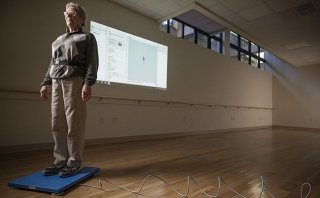New Study Finds Medicare Advantage Enrollees Experience Similar Declines in Frailty Over One Year Compared With Traditional Medicare Enrollees
More work is needed to better understand the health services needs of older adults with frailty.
-

Assistant Scientist II
Enrollment in Medicare Advantage (MA) plans is not associated with altered frailty trajectories compared with enrollment in Traditional Medicare (TM), according to research published in the JAMA Network Open.
In the article Frailty in Medicare Advantage Beneficiaries and Traditional Medicare Beneficiaries, lead author Sandra M. Shi, MD, MPH, and colleagues suggest that more work is needed to better understand the health services needs of older adults with frailty.
“A growing proportion of the population is enrolling in Medicare Advantage, which typically offers additional benefits compared with Traditional Medicare,” said Dr. Shi, a geriatrician and clinician-investigator at Harvard Medical School and the Hinda and Arthur Marcus Institute for Aging Research at Hebrew SeniorLife. “In this study, we sought to determine whether frailty and frailty trajectories differ between MA enrollees and TM enrollees.”
The cohort study of Medicare beneficiaries from 2015 found that MA enrollees experienced similar declines in frailty over one year compared with TM enrollees. The researchers believe that future work should examine whether the specific types of services covered by health insurance can impact frailty and health trajectories for older adults.
This retrospective cohort study used data from the National Health and Aging Trends Study (2015-2016). Analyses were conducted from August 2023 to March 2024. Participants were community-dwelling Medicare beneficiaries aged 65 years and older.
Additional researchers include Brianne Olivieri-Mui, PhD, MPH, Department of Public Health and Health Sciences, Bouve College of Health Sciences, Northeastern University; Chan Mi Park, MD, MPH, Harvard Medical School and the Hinda and Arthur Marcus Institute for Aging Research at Hebrew SeniorLife; Stephanie Sison, MD, MBA, Department of Internal Medicine, University of Massachusetts Chan Medical School; Ellen P. McCarthy, PhD, MPH, Harvard Medical School and the Hinda and Arthur Marcus Institute for Aging Research at Hebrew SeniorLife; and Dae H. Kim, MD, MPH, ScD.
About Hebrew SeniorLife
Hebrew SeniorLife, an affiliate of Harvard Medical School, is a national senior services leader uniquely dedicated to rethinking, researching, and redefining the possibilities of aging. Hebrew SeniorLife cares for more than 4,500 seniors a day across campuses throughout Greater Boston. Locations include: Hebrew Rehabilitation Center-Boston and Hebrew Rehabilitation Center-NewBridge in Dedham; NewBridge on the Charles, Dedham; Orchard Cove, Canton; Simon C. Fireman Community, Randolph; Center Communities of Brookline, Brookline; Jack Satter House, Revere; and Leyland Community, Dorchester. Founded in 1903, Hebrew SeniorLife also conducts influential research into aging at the Hinda and Arthur Marcus Institute for Aging Research, which has a portfolio of more than $98 million, making it one of the largest gerontological research facilities in the U.S. in a clinical setting. It also trains more than 500 geriatric care providers each year. For more information about Hebrew SeniorLife, follow us on our blog, Facebook, Instagram, Threads, and LinkedIn.



